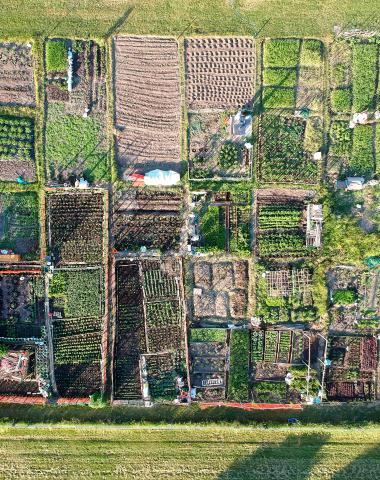Embracing Organic’s Regenerative Roots and Weeding Out Greenwash
17 November 2025 – Over 350 participants from around the world tuned in to a highly-anticipated webinar exploring how organic and genuinely regenerative actors can collaborate to advance truly regenerative agriculture.
The event featured speakers from IFOAM – Organics International, the Rodale Institute, and Regenerative Agriculture Alliance, each offering perspectives grounded in policy and market advocacy, scientific research, and ancestral knowledge:
- Paul Holmbeck, IFOAM – Organics International World Board member
- Andrew Smith, Rodale Institute
- Reginaldo Haslett-Marroquin, Regenerative Agriculture Alliance
Moderated by Sarah Compson, Standards Innovation Director of Soil Association and IFOAM – Organics International World Board member, the session examined the scientific and holistic origin of regenerative agriculture. Speakers highlighted how the term has been increasingly and often unhelpfully co-opted, and outlined approaches to restore the movement’s original aspirations
Throughout the discussion, speakers emphasised how the organic, regenerative, and agroecology movements can align more closely when guided by shared principles and by centring farmers in enterprise and system transformation.
Highlights and Key Takeaways:
- "Regenerative” mindsets, craftsmanship and messaging has captured the imagination of farmers, food companies, retailers, philanthropies and policy makers. But it is also driven forward by hype and the ease with which “regenerative” can be used to greenwash companies while continuing with de-generative practices.
- Large agribusinesses and cultural media are embracing regenerative language while resisting agroecology and organic initiatives across the African Union, European Union, and national policy arenas.
- Despite bold rhetoric, corporate regenerative claims are rarely backed by robust strategies or action.
- In its statement “Elevating truly regenerative agriculture”, the organic movement reaffirms its commitment to calling out on regen greenwashing, and working with serious regenerative and agroecological partners, creating pathways for and with farmers through Participatory Guarantee Systems (PGS) and peer-to-peer approaches.
- Ecological regenerative agriculture, as defined by Sir Albert Howard (1946), is rooted in recycling organic matter and returning nutrients to the soil rather than merely extracting them.
- In the U.S., “regenerative agriculture” often refers to no-till and cover-crop practices, though many farmers use the term more broadly to describe approaches they believe can improve land stewardship.
- Long-term data from the Farming Systems Trial (1981- present) show concerning correlations between no-till practices and cancer rates.
- Truly regenerative organic agriculture shall include a socio-economic dimension, ensuring fair returns to farmers and equitable support for farming communities.
- Regeneration is ultimately a system-level outcome, emerging from interlinked economic, social, and ecological efforts and actions.
- Economically, regenerative systems require full cost accounting and equitable access to and distribution of wealth.
- Socially, they prioritise nutrient integrity to protect human health.
- Ecologically, they integrate water systems, biodiversity, and soil health.
- A global regenerative movement can be advanced by uniting organisations working directly with the world’s 700 million farmers and by strengthening standards and certifications built on PGS and peer-to-peer certification models.
Highlights from Q&A:
- Holmbeck: Regulatory frameworks for conventional farming, such as pesticide restrictions and pesticide fees, send clear signals about undesirable practices. Increasing pressure on degenerative practices creates opportunities for organic and regenerative approaches.
- Haslett-Marroquin: Real change begins at the grassroots. In the U.S., agribusiness’ influence over the government makes progressive regulation difficult. Efforts should focus on organising communities to drive bottom-up transformation.
- Holmbeck: Encouraging developments are emerging across East, West, and Southern Africa, where countries are developing national strategies for organics and agroecology. Thirteen nations, including Malawi, are sharing best practices. Building capacity within farmer-led frontline organisations is key to driving change.
- Smith: A robust body of research demonstrates the economic and ecological benefits of organic and regenerative systems. Such evidence can help shift discussions with policymakers at local and national levels.
What Comes Next?
The strong attendance and lively discussion reflected how deeply this topic resonates within the organic community. It is a pivotal moment for the organic sector to work with farmers, policymakers, and market actors to demonstrate how organic agriculture can deliver on regenerative aspirations, and how these aspirations can be translated into practice alongside truly regenerative and agroecological partners.
Across the movement, both small and large initiatives are emerging to help shape an organic agenda within the broader regenerative ecosystem. Related information and resources can be found in the section below.
Resources
- Watch the webinar recording on YouTube (click here to view)
- Download Zoom webinar here (password: a1&AWUnR)
- Access the presentation materials, download them here
- Additional reads:
- Update on our actions and what you can do: Statement on regenerative has struck a chord!
- Statement from the global organic movement: Elevating Truly Regenerative Agriculture
- Report from Friends of the Earth: Rethinking No-Till
- Report from FAIRR: The Four Labours of Regenerative Agriculture
- Organic Voices: Concerns with Regenerative Agriculture Labels
The views expressed in this webinar are those of the speakers and do not necessarily reflect the official position of IFOAM – Organics International.
